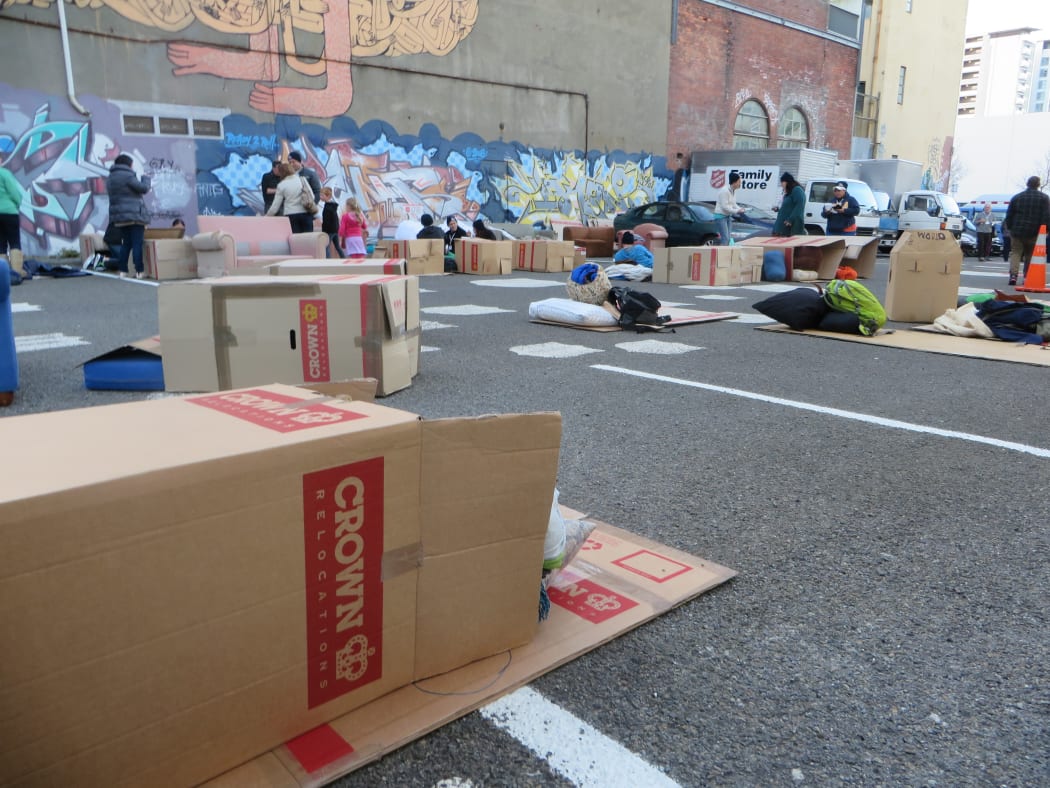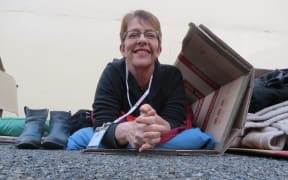Wellington Night Shelter is making an urgent plea to ratepayers for extra money to keep the doors open after missing a crucial funding deadline.

The council aims to end homelessness in Wellington by 2020. Photo: RNZ / Shannon Gillies
The service, which provides accommodation for up to 52 homeless men a night, is experiencing record demand.
Its acting manager Tyler Dunkel said Wellington was experiencing a massive influx of homeless people, probably due to the housing bubble, which was "squeezing out those on the margins".
The shelter was experiencing a $30,000 funding shortfall and had asked the council for emergency funding. An administrative error meant it missed out on NZ Lotteries funding. Although it had appealed to the lotteries board to consider funding it anyway, its request was rejected, the council said.
Long-serving staff members report they have "never seen the shelter so busy", with both its shared dormitory and hostel for longer-term clients running at 90 percent capacity.
"If I'm experiencing a full-house in the summer, it's really going to be chokka in winter," Mr Dunkel said.
"It really is a concern."
The spike in demand has coincided with an extremely turbulent period for the shelter and its board.
Mr Dunkel is the third manager since August and its chairman, John Kennedy-Good, is also the third to hold that position in the last year.
Mr Kennedy-Good said without a cash injection, reserves will dry up in April.
"We dropped the ball, simple as that... but we have now improved our internal procedures to make sure we don't miss any further deadlines."
However, the shelter faces an even bigger problem next year, with a looming deficit of $100,000 just to keep the basic service going.
Mr Kennedy-Smith said the Night Shelter was hit hard by the 2014 Employment Court ruling that night care workers should get at least minimum wage.
"That cost us $100,000 in backpay and we've never recovered from it. We need to raise - in addition to the grants we already receive - an extra $100,000 a year."
That represents a 25 percent increase on what the Night Shelter already gets from grants, including the $95,000 a year it gets from Wellington City Council under a three-year contract signed last year.
Councillor Paul Eagle, who chairs the council's Community, Sport and Recreation Committee, said it was "highly likely" councillors would approve the funding top-up.
However, he said the council was looking to see some major changes, including improvements to governance and management, and changes to the service to bring it into line with Wellington's long-term strategy to end homelessness, Te Mahana, which aims to end homelessness in the capital by 2020.
"They go into the Night Shelter at night, they come out at 7.30 in the morning and go straight down to the Soup Kitchen. That's not a good model.
"What we'd like to see, if we're going to invest ratepayers money into this and top it up, then with this will come a much better service that will actually resolve homelessness."
Mr Dunkel and the Night Shelters staff and trustees could not agree more.
But Mr Dunkel warned that it would not be cheap.
The current shortfall of $30,000 was just to keep a roof over people's heads and the service operating at "subsistence level", he said.
The Night Shelter wants to replace the revolving door service with a "Housing First" policy: putting people straight into their own homes with wrap-around services to keep them there.
Overseas experience has found such services are hugely successfully in keeping people off the street.
After one year, up to 80 percent are still in their own homes.
"These guys don't want to be homeless - who wants to be homeless?
"And what we can do is offer them a helping hand. We can reach out and say, 'I'm here, stand with me. You got knocked down, I can help you stand'. And here in New Zealand, we're very capable of doing that."
The council's Community, Sport and Recreation Committee will meet on Wednesday to discuss the $30,000 required.


